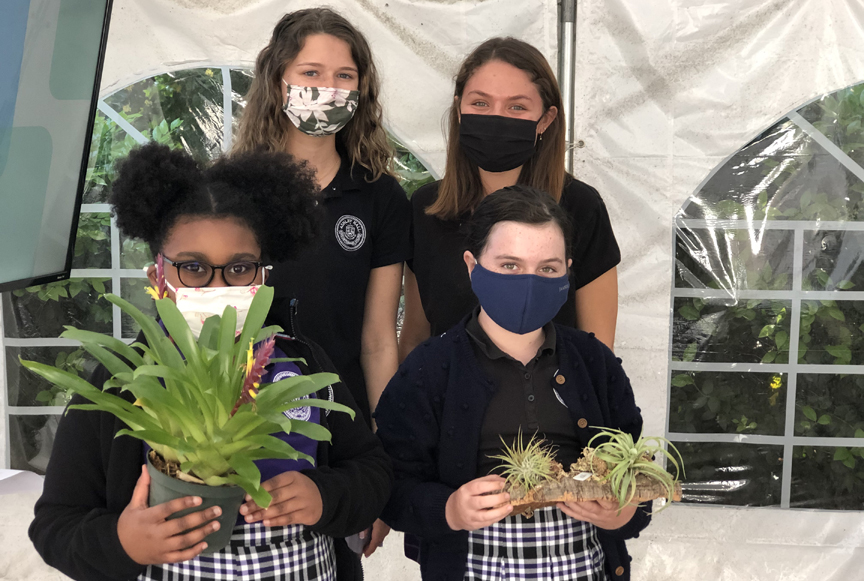
While contemplating how to approach their bromeliad scientific experiment design process, Honors Biology II students Wickie Fort ’21 and Ava Piebenga ’21 knew they wanted to include a community approach to share the fascinating knowledge they had gained this year from Upper School faculty member Allison Bowden. With both having a passion for working with children, the solution was easy: nurturing the next generation.
“Based on their interactions as assistant teachers during Ashley Hall’s Horizons program, Ava and Wickie wanted to share their knowledge of bromeliads with that group,” said Bowden. “They decided to start local before branching out and proposed a plan to work with a group of third grade students at Ashley Hall. They developed an interactive presentation on bromeliads and came up with a pre- and post-test to measure their impact on the students.” In addition to teaching students about bromeliad growing requirements and their ecological importance to other plant and animal species, Fort and Piebenga led a separate day of potting and planting at the Elizabeth House greenhouse with students, who each took home a bromeliad labeled with genus and species name. Afterward, Fort and Piebenga shared their thoughts about leading the enriching experience.
Why did you want to include a hands-on teaching element to the bromeliad scientific experiment? What inspired you?
Ava Piebenga (AP): “Since I joined the Ashley Hall community in fifth grade, I have learned that I am a much better student in a ‘hands-on’ learning environment. When Wickie and I started to design our experiment procedure, we both knew that it was extremely important that we include some form of ‘hands-on’ experience, whether that be simply handling the plants and practicing the ‘two-finger-touch’ to identify the different parts or actually getting dirty in the greenhouse while planting the bromeliads.”
Wickie Fort (WF): “Including hands-on teaching elements was really important in our lesson plan. After three summers of working with kids in the Horizons program, we were definitely aware of how much a difference a hands-on and engaging lesson plan can make when it comes to kids paying attention and retaining information.”
What did you enjoy most about the experience? Were you pleased that you took this approach to your experiment design?
AP: “I loved how engaged and eager to learn each of the girls was during both the lecture style PowerPoint presentation and our time at the greenhouse. They truly showed me that they cared about our project (one little girl even said that she was really glad Wickie and I had given our presentation to them), and I was extremely impressed by their ability to retain knowledge. We gave them a ‘bonus’ during the presentation: the scientific name for Spanish Moss—Tillandsia usneoides. At the beginning they had to write it down to remember, but the next time we saw them (without their notes), they helped each other out while they tried to remember the name, and they did!”
WF: “I was extremely delighted by how excited the girls were to learn about bromeliads. They were super engaged and always gave very thoughtful answers to all of our questions. I was especially impressed by how well-spoken each of the girls was. I loved that Ava and I were able to go in a different direction for our final experiment. This social experiment gave us the freedom to tie in our passion for children and teaching into Honors Bio II. It was amazing to see our passion for educating and plants collide.”
Why is teaching (and especially sharing your scientific knowledge with the next generation) important to you?
AP: “I have been so fortunate during my time at Ashley Hall to have teachers, especially science teachers, who are truly passionate in their line of work. This has made a big impact on me as a student, but especially as a student who is interested in going into a teaching career. I believe that once you find something that makes you happy and excited to learn, it is so important to pass that love and passion forward to future generations.”
WF: “Throughout this entire year in Honors Bio II, I have been so fortunate to have a teacher as engaging and passionate as Mrs. Bowden. Any opportunity I have to pass on what I have learned from her—not only about plants but also general life lessons of positivity and gratitude—is an opportunity that I jump on. As Ava and I are starting a new journey with college next year, it is so important to have younger girls at Ashley Hall who are excited about the science, the Earth, and all the world has to offer. Working with these girls was a chance for me to pass along some of what I have learned from Mrs. Bowden’s class, and I am so grateful that the Lower School made our social experiment possible.”
